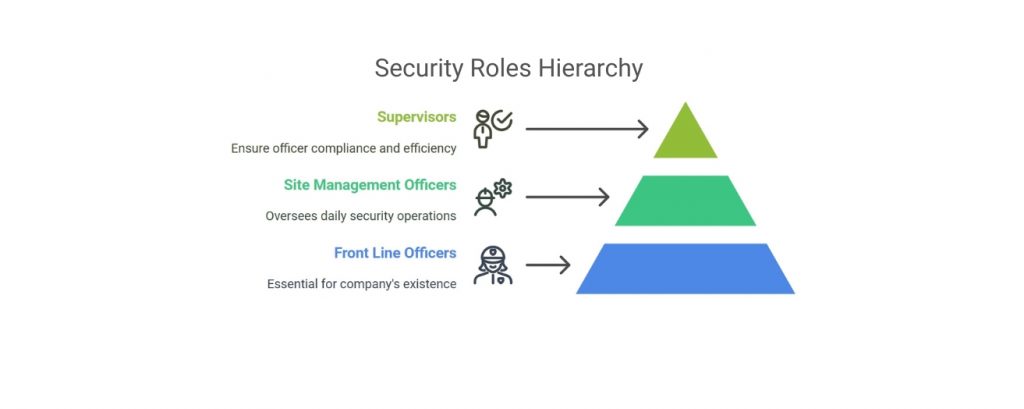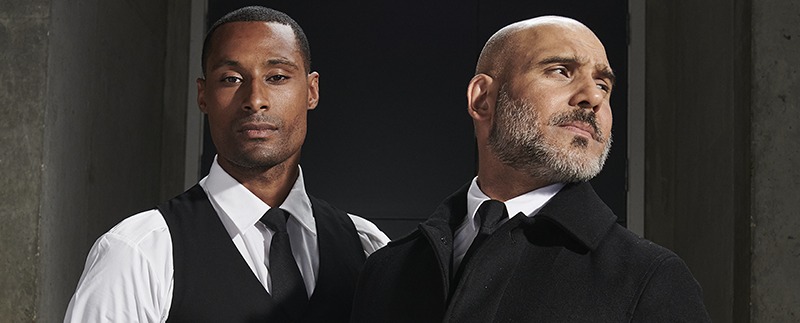There is a veritable ocean of management job descriptions in the UK security guarding sector. If things were not confusing enough, many companies use different names for similar traditional roles. Most companies will choose the security company management structure that best suits the way they work, with either a myriad of managers or very few. No two companies will have the same set-up, so this is quite a tricky subject to tackle, but, in general, this chart provides the more popular job titles and a very brief summary of what they do and where they fit in any organisation.
I have worked for companies that have quite literally asked me what job title they should put on my business cards, so I have left out some of the lesser-used roles I’ve done, including ‘Client Relationship Manager’, and ‘Special Projects Manager’.
If this isn’t the way your employer or company does things, please don’t shoot the messenger, but this should give you a general idea of who does what and where. I also recommend checking out our blog on steps employers can take for security industry improvement.

Listed in order of operational importance:
Front Line Security Officers
(& site based management & supervisors)
The most important men and women in the company, without whom the rest can not exist.
Chief Executive Officer (CEO)
The “big cheese” & the final arbiter of all strategic decisions.
Managing Director
Responsible for day-to-day operational & commercial decisions.
General Manager (Optional)
Supports and stands in for MD. Usually responsible for specific business aspects (bid writing, staff welfare, training, etc.)
Operations Director
Again, the operations director works closely with the MD / CEO. Normally, the senior manager is involved with monthly & annual client KPI meetings and service reviews. Ultimate responsibility for the quality of service and incident handling.
Head of Operations (Optional)
Provides support and guidance for operations managers. Ensures issues are investigated and resolved, and client relations are maintained to a high standard.
National Account Managers (Optional)
Where utilised, these managers are responsible for large, important clients, with sites across the country and potentially beyond.
Regional Managers (Optional)
These are senior operational managers who normally support the Head of Operations. Where used, they are normally responsible for large geographical areas and have several operations or area managers working for them.
Area / Contracts / Operations Managers (Interchangeable)
The ‘engine room’ of any company’s guarding operations. Hands-on regular client liaison, staff welfare, and troubleshooting. Bad contract managers can ruin businesses.
Operations / Contract Support Managers
These helpful office-based managers enable operations managers to spend more time visiting sites and servicing clients. They handle the bulk of routine admin. (Chasing vetting, uniforms, holiday booking, arranging cover, and more.)
Control Room Supervisor / Manager
This is a vitally important role, taking overall responsibility for operational communications. This manager needs to ensure that any blowouts, incidents, emergencies or enquiries are dealt with promptly and accurately.
Mobile Supervisors (Optional)
When Operations Managers have larger portfolios, mobile supervisors are important to ensure that sites are visited on a regular basis, including weekends and nights.
Controllers / Schedulers
Responsible for the day-to-day operations of the control/communications room. Ensuring that any gaps in staffing levels are covered, and that all incoming calls, incident reports, and enquiries are correctly triaged.
Recommended Read: How To Write The Perfect Job Ad
How Security Company Structures Typically Work
The list above isn’t a simple security company structure by any means, but it would be extremely rare to have a single company use all of the job descriptions mentioned. Most small to medium-sized companies get along just fine with a set-up like this: Security Officers – CEO – MD – Operations Director/s – Operations Managers – Controllers.
I hope this has been of use to my front-line friends and indeed, some of the security company start-ups that I’ve spoken to recently.

Build the Right Team with GuardPass
Whether you’re a security start-up designing your team structure or an established firm scaling operations, understanding role hierarchy is key to success. At GuardPass, we help you find and vet the right people to fit every layer of your security company’s structure — from frontline officers to operations directors.
Explore how GuardPass supports your hiring strategy.
